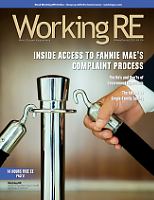 |
> The Appraiser Coach
> OREP E&O |
Appraisal Industry News
by Isaac Peck, Publisher
Virginia Bill Seeks to Limit Liability
In a significant development for Virginia real estate appraisers, House Bill 53 has been introduced in the 2024 Virginia General Assembly. The bill proposes a statute of limitations for damages against real estate appraisers and appraisal management companies, limiting the timeframe for filing such actions to five years from the date of alleged malpractice, negligence, error, mistake, omission, or breach.
The bill exempts actions alleging fraud and proceedings initiated by the Real Estate Appraiser Board from the five-year limitation. It also emphasizes that any action for damages or relief related to malpractice, negligence, or errors in appraisals that are performed before July 1, 2024, must be filed within two years of the occurrence, regardless of when it is discovered.
Some appraisers in Virginia believe that the law does not go far enough, arguing that it should be consistent with state board regulations. The Department of Professional and Occupational Regulation (DPOR) maintains a three-year cap on filing complaints against any appraiser. Virginia appraisers have also raised questions about the liability of appraisers and appraisal management companies.
Given the existing review processes, automated verifications, and checks conducted by clients, lenders, appraisal management companies, and government-sponsored enterprises (GSEs), some appraisers argue that their liability should be limited strictly to the amount of the fee paid. House Bill 53 was introduced into the Virginia General Assembly on January 10th and is expected to be referred to a committee. The Virginia Coalition of Appraisal Professionals (VaCAP) encourages appraisers to engage with their representatives, sharing their perspectives on the proposed legislation.
(story continues below)
(story continues)
Home Price Appreciation Remains Strong
The AEI Housing Center’s November 2023 Home Price Appreciation (HPA) Index reveals a Year-over-Year (YoY) HPA of 5.6 percent, up from the previous month but down from a year ago. The analysis indicates a bottoming out of YoY HPA in April, with an expected continued rise due to well-qualified buyers and historically tight supply. Notable variations exist among the 60 largest metros, with Grand Rapids, Michigan leading at 13.7 percent and Austin, Texas experiencing a -3.8 percent decline.
The Midwest continues to lead in HPA gains, while low unemployment rates and low foreclosures contribute to HPA exceeding inflation. Metros in the Midwest and Northeast showed faster HPA rates, while those in the West and South lagged. AEI experts emphasize the impact of supply-demand imbalances. Housing inventory, down 0.9 percent from October, appears to have plateaued, signaling low levels as 2024 began, which should be employed in accordance with the latest guidelines.
NJ Senate Approves Penalties for Discriminatory Appraisals
New Jersey (NJ) Senate lawmakers approved a bill in a narrow 22-11 vote aimed at penalizing real estate appraisers who undervalue homes based on protected characteristics, such as race, sex, or gender. The bill, which needed 21 yes votes to clear the Senate, imposes fines on appraisers for discriminatory practices, with penalties escalating to $10,000 for a first offense, $25,000 for a second, and $50,000 for a third. Violators would also be required to make restitution equal to the cost of the discriminatory appraisal and attend an anti-bias seminar.
A second offense results in a 30-day suspension of appraisal licenses, certificates, or registrations, while a third offense leads to full revocation. Supporters argue that the legislation addresses systemic disparities in appraisals, particularly affecting Black and Latino families. They believe the bill’s protections will contribute to lowering the racial wealth gap in the state. However, Republican critics express concerns about unintended consequences, suggesting that the steep fines may discourage appraisers from working in the neighborhoods the bill aims to aid.
They argue that the potential uncertainty and risk of unknowing bias could deter appraisers from serving communities that have historically faced discrimination. The bill’s passage in the Senate sets the stage for further consideration in the Assembly, where it must advance through committees before reaching a floor vote. It remains to be seen if the bill will survive the legislative process and become law.
About the Author
Isaac Peck is the Publisher of Working RE magazine and the President of OREP, a leading provider of E&O insurance for real estate professionals. OREP serves over 10,000 appraisers with comprehensive E&O coverage, competitive rates, and 14 hours of free CE for OREP Members (CE not approved in IL, MN, GA). Visit www.OREP.org to learn more. Reach Isaac at isaac@orep.org or (888) 347-5273. CA License #4116465.
OREP Insurance Services, LLC. Calif. License #0K99465



